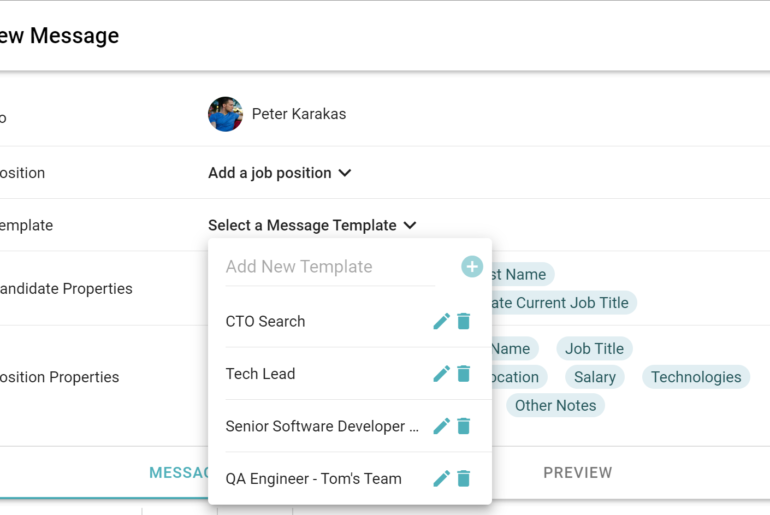In the past, career paths were practically set in stone. You joined a company as a graduate at some low-level position, stayed put, and slowly rose through the ranks over several decades. If you were lucky, you got to change companies a few times, but you still ended up dedicating many years of your life to each employer.
This is no longer the case today. Professionals are spending less and less time at each job, crossing back and forth between industries, and exploring different career paths. From 1990 to date, the number of people who have remained in the same job for less than two years has more than doubled from 16% to 51%.
According to a report by global staffing firm Robert Half, about 67% of professionals—especially millennials—with college degrees were in favor of job hopping. A survey by the ADP revealed that nearly half of employees in the UK (47%) intend to change jobs in the next three years and only 17% plan to spend the rest of their career in their current company.

Research shows that people are most likely to quit their jobs after their first, second, or third work anniversaries, and 70% of millennials will quit their jobs within two years. Furthermore, around 50% of software developers typically spend two years or less at an organization before jumping ship.
What does this all mean for you if you have a personal history with job hopping or are considering going down this path? Do the benefits outweigh the risks? How many short job stints is too many?
In this post, we’re going to take a look at the advantages and downsides of job hopping, so you know how it can impact your career and whether it’s the right option for you.
Ready?
- How long should you hold down a job?
- The benefits of job hopping
- 1. Stay updated with what’s happening in your industry
- 2. Faster career growth and advancement
- 3. Secure higher earnings and significant salary increments
- 4. Acquire more skills and experiences
- 5. Expand your professional network
- 6. Switch to a different career path
- 7. Change of location
- 8. Better culture and work-life balance
- How job hopping can hurt your career
- 1. It can make you less hireable
- 2. Career plateau and stagnation
- 3. Increased job dissatisfaction
- 4. Lack of clear forward advancement
- 5. You’ll be seen as a flight risk
- 6. Loss of fringe benefits
- 7. Diminished credibility as a leader
- 8. Lower income and job statuses
- 9. It tells potential employers that you’re easily bored
- Conclusion
How long should you hold down a job?
In the UK, five years is the acceptable length of time to stay with one employer. The US Bureau of Labor Statistics reports that the median number of years that Americans stick to a job before switching is 4.1 years.
According to a survey by PayScale and Millennial Branding, 41% of baby boomers believe that workers should remain in a job for at least five years before moving to a different company. For millennials, the number is only 13%, which is unsurprising considering that they change jobs three times more often than previous generations.
What hiring managers in one region consider to be an appropriate length of time to stay in one company before leaving might be different from the expectation of hiring managers in another area. However, the general consensus seems to be that changing jobs frequently and holding each role for a short time, typically less than two to three years, amounts to a pattern of job hopping.
This means that if you consistently leave jobs without putting in a tenure of at least two or three years, you could earn the reputation of being a job hopper, which might make interviewers a lot more skeptical about giving you a position in their companies.
The benefits of job hopping
Job hopping gets a bad rep, but there are many reasons why people keep doing it, and sometimes it pays off handsomely. Here are some rewards that people who regularly change jobs might enjoy compared to their counterparts who stick around for longer periods.
1. Stay updated with what’s happening in your industry

People who hop from one job to another demonstrate a greater learning curve than people who retain the same position for many years. Job hopping gives you a chance to experience new work environments, see how things are being done in other companies and industries.
When you stay in a company for a long time, especially as a developer, you might start to fall behind on the latest trends and updates in your industry. Instead of learning new languages, taking courses, completing certifications, and taking on challenges that could sharpen your mental and technical faculties and progress your career, you’re stuck giving all your attention to internal priorities.
If you’re working with technologies that are company-specific or not widely used, you might wake up one day and realize your skills have become obsolete and unable to measure up to the demands of the current job market.
But if you hop around different jobs and play your cards right, you will acquire a wide range of transferable knowledge that can stave off complacency and make you highly sought after in your area of specialization.
2. Faster career growth and advancement
When you’re with a company, the only way to move up the career ladder is by getting a promotion, which usually takes a while. And sometimes, due to internal politics and bureaucracy, you could work your ass off for years and still not be considered for or given a promotion even though you’re deserving of it.
Depending on the organization you work for, there might not be a higher position for you to advance to. If there is, you might have to wait for the person currently occupying it to leave before you can take the job, and that may not happen anytime soon.
Taking a job in a different company can get rid of these bottlenecks and enable you to climb higher on the career ladder more quickly. Instead of waiting around for years for a chance at being promoted, you can simply take matters into your own hands and apply for higher-level roles at another organization.
3. Secure higher earnings and significant salary increments

Studies show that people who change jobs regularly earn 50% more on average than people who stay with one company. According to Zippa, the average salary increase and wage growth you can enjoy when you switch jobs is 14.8% and 5.8% respectively.
Based on the findings of the payroll company ADP, job switchers have gained an increase in salary growth of 8% since June 2020. Meanwhile, most companies only offer pay raises of about 3% year over year or—if you’re lucky—pay raises in line with inflation.
So if you’re working for a company that doesn’t offer salary increases or offers pay raises that don’t reflect inflation, you’ll essentially be taking a pay cut year after year. In these situations, it’s easy to see the sense in job hopping.
For many organizations, the hiring budget is usually bigger and more flexible because they’re competing for top talent in an open market. But when it comes to internal operations, their budgets and compensation structures are designed to maximize profits.
This means that companies looking to hire quality talent, especially in the tech market, are willing to offer professionals a larger paycheck to get them to switch sides. So you can easily increase your earnings significantly by changing jobs and negotiating a higher pay than waiting for your current employer to give you a bonus or raise.
4. Acquire more skills and experiences
Job hopping can enable you to gain a wide range of experience with different companies and industries and grow your skillset beyond what might be available to you in one company alone.
Let’s say you’re a software engineer working for a company that builds products using Python. If you decide to learn a new language, say React JS, and you want to acquire real-world experience working with it, moving to another company that uses it in its tech stack can help with that.
When you hop between jobs, you’re likely to end up working with different architectures, infrastructures, tech stacks, and programming languages. Your broadened experience can allow you to bring a lot more to any engineering team you’re a part of and contribute fresh insights when solving technical problems.

In addition to technical skills, navigating different company processes and colleagues might also equip you with valuable transferable and soft skills. It could dramatically improve your communication, adaptability, networking, and relationship management abilities.
This is because every time you change jobs, you have to learn a whole new company environment, management styles, and product/market perspectives. You also have to take on different responsibilities, find out how things are done, and how to connect with your new coworkers, ultimately shaping you into a well-rounded employee.
5. Expand your professional network
Depending on your job role and where you work, you might get very limited opportunities to network socially or professionally. You could end up with no mentors to look up to or very few professionals on your level that you can talk to about work challenges, get advice from, or strategize and grow alongside of.
But every time you start a new job, you are presented with a chance to meet new people from diverse backgrounds. You can make new friends and grow your social network or build strong professional relationships that could come in handy in the future.
6. Switch to a different career path
Maybe you accepted a job after graduation because you needed something to do and it seemed exciting at the time, but now you’ve outgrown that ambition. Or maybe you got into an industry because the work was fun, rewarding, and challenging, but you’ve been working with the same technologies for years and you are itching to try something else.
Whatever your reason for wanting to switch careers, job hopping can be a more convenient route to exploring professional possibilities than remaining at your present job. Your current organization might not have the position or challenge you’re looking for, so it makes sense to go looking for alternatives elsewhere.
7. Change of location

If you love experiencing new cultures and discovering new cities, job hopping can make it a lot easier for you to live out your dreams. Your present organization may not have offices across the nation or globe. Even if they do, relocation opportunities might be few and far between, and tricky to maneuver.
However, with job hopping, all you have to do is find a good job in another part of the world and you can relocate anytime you want. Some companies even offer logistical and financial assistance to new employees who want to relocate, so you might be able to cut down moving costs that way.
8. Better culture and work-life balance
With the drop in Covid-19 infection numbers, many companies that instituted a work from home policy are now clamoring for their employees to return to the office. As a result, many professionals have quit or intend to quit their jobs to search for opportunities that offer remote work and other benefits that they consider a priority.
Whether you are in this boat or your current work situation is toxic or stressful for one reason or the other, hopping to a new job with better culture and benefits can greatly improve your health, productivity, and work-life balance.
How job hopping can hurt your career
Higher pay, more acquired skills, and a wider network might sound like good enough reasons to jump on the job hopping bandwagon, but there’s a lot that you could stand to lose in the process. If you make a habit of going from job to job and only spending a short term at each one, your career can suffer terribly as a result.
1. It can make you less hireable
An analysis of a random sample of 6,976 applications across 365 cities and 105 industries in the United States revealed that candidates who quit, were fired, or laid off within the first 15 months of a previous job were 43% less hireable when applying to new jobs.
The callback rate for interviews for these applicants was 7.6%, compared to 13.4% for their counterparts who remained in positions for longer than 15 months. According to the study, this is equivalent to sweeping away nearly five years of experience off your resume.
It costs a lot of money to hire and train a new employee, so hiring managers will often set your CV aside and hesitate about extending you an interview or job offer when they see you have a history of job hopping. Why should they waste time and money on you when you’re likely to up and leave them in a few months the same way you left previous positions?

Although some startups and companies might be willing to take a chance on you and even appreciate your status as a job hopper, you will have a harder time convincing long-established organizations that you are worth the risk.
This is because many companies place a high value on retention and low staff turnovers. They want employees that are going to stick with them for a long time. Besides, it can take up to six months for you to fully grasp the responsibilities and intricacies of your new role and upwards of a year for you to start performing at a high level.
If you leave shortly after that, their investment in you would not have paid off. So despite having all the right skills and experience, companies might still view your history of job hopping as a red flag and settle for another candidate that has proven to be loyal and will likely stay with them for the long haul.
2. Career plateau and stagnation
Your resume is supposed to tell a coherent story about your professional journey. Every time you make a change and wind up in a new job, it should benefit your career somehow.
If you’re job hopping because you’re chasing a higher salary, but your skill set is not necessarily growing, you might end up plateauing or becoming overpriced for the market. Your resume may be five to ten pages long, but with no list of achievements to back it up because you keep leaving before your work has had time to bear fruit.
You have a long list of companies you have worked for, but you can’t really point to the impact that you had on the business beyond just being employed there. You just keep recycling the same role with the same responsibility again and again.
Eventually, you will master all the challenges. You won’t be learning anything new. And you will hit the payment ceiling for that position, without a wealth of experience to make your CV attractive to future employers, so no one will want you.
3. Increased job dissatisfaction
Another disadvantage of job hopping is that it can encourage you to become routinely dissatisfied with your job. When you start moving to a new job whenever issues arise, you dislike the work, or just because there’s a seemingly better offer on the horizon, you may never learn how to deal with challenges.
The truth is you’re not going to be a hundred percent happy with your work and company all the time. There are probably going to be some things you wish were better or different.
Rather than hitting the brakes and running away at the first sign of discomfort, learn to stir into the skid. Commit yourself to finding solutions to the problems, be patient, and understand that changing the way things are done takes time. Try to be content with the good work you are doing and the impact you’re creating in your current job.
That’s how you become a well-adjusted and adaptable professional that can still get the job done even when all the factors aren’t right. It’s better to give yourself time to grow into a role and acclimate to the company atmosphere before throwing your hands up in defeat and going in search of alternatives.
4. Lack of clear forward advancement
A lot of movement can leave you with an experience level that’s inconsistent with your work history. Let’s say you’ve had four different jobs in five years or less, you probably didn’t get enough time with each one to acquire substantial expertise or skills in the role.

So even though you have worked in a lot of places you might find that you don’t possess enough experience to move to the next rung on the career ladder. But when you stay in one organization for three to five years or more, you will end up gaining consistent knowledge, guidance, and direction that can promote growth, help you identify and inspire improvement in your weaker areas.
When prospective employees look at your resume, they want to see that you’ve been advancing or moving into better opportunities. If all your resume shows is that you have been making lateral career moves or taking steps back, it will probably be held against you and lead to your application being tossed in the rejection pile.
5. You’ll be seen as a flight risk
Even though you stand to gain a lot as a developer from working in different company environments and industries, too many changes on your resume can stir doubt and hesitation for recruiters and hiring managers.
They will start to suspect that maybe there’s a sinister underlying reason necessitating your frequent job moves. Could it be that you’re not interested in contributing to the long-term success of a company?
Were you strategically managed out of these short stints because of conduct or performance issues? Are you a prima donna who resigns over trivial or unavoidable issues? Do you have unrealistic expectations about work and job satisfaction?
Based on these plausible assumptions, recruiters can write you off as a flight risk because they can’t guarantee that you won’t just walk away from your next role if they choose to hire you. For them, it’s safer to bet on a candidate that has had meaningful tenure in permanent positions—between two and five years—years and a valid or positive reason for leaving previous positions.
6. Loss of fringe benefits
Job hopping usually entails having to start afresh. You will be a new employee in a different company and a lot of things about your status are going to change to reflect that.
For example, many companies don’t let you take vacation days until you’ve worked with them for a length of time, say six months, and even after that, you might get fewer days than other employees that have been there for a year and more. Any vacation time or paid time off that you’ve saved over the months or years at your previous job will be lost.

Also, you might have to change insurance plans and the benefits in your new place might not be as good as your previous plan. The cost and deductibles for your coverage may increase. The hospitals in your new HMO network might not be as convenient as the old ones and you will have to develop a relationship with a whole new set of doctors.
Your retirement income is also likely to go. Regardless of whether you can immediately access a 401(k) or other savings vehicle, by changing jobs, you may not stay long enough to qualify for your employer to match savings to your account. Similarly, you might stay long enough to have your employer match your contributions but leave too soon before they vest, so it’s like you never had them to begin with.
7. Diminished credibility as a leader
If you’re a senior-level professional or looking to move into a management role, having a reputation for hopping around might count against you in your current and future employment.
This is because in senior and management roles, you are expected to be influential in retaining junior employees and other members of your team. To achieve this you will need to stay in the company for a long tenure so you can sufficiently impact your department and garner significant accomplishments and milestones.
Hiring managers know that when managers come in and leave an organization frequently, it can drastically disrupt culture, productivity, and performance across the department or company in general. They are not going to want to hire someone likely to leave in a year or two, just when they’re starting to have an impact on their teams.
Unity and stability are some of the vital ingredients required to build and maintain a high-performance team. Being a job hopper can indicate that you do not align with those characteristics, and consequently, might not be well-equipped to lead others.
8. Lower income and job statuses

According to a research into the impact of job hopping on future employment success carried out by Professors Harvey Krahn and Nancy Galambos of the University of Alberta, Canada, careless job changes can be very harmful to professionals.
Their findings revealed that more frequent changes in employment status in the early 20s led to lower income at age 32 for men and women. Furthermore, men with more job moves also reported lower career satisfaction and wound up in lower status jobs at age 32.
This goes to show that while transitioning from job to job often can bring some short-term rewards like a salary bump and better job title, in the long run, it can have a harmful effect on your career outcome. In about a decade, you may end up with less career growth, earning, and job satisfaction than your counterparts who held onto their jobs for longer and hopped around less.
9. It tells potential employers that you’re easily bored
Desiring new challenges and wanting to be passionate and engaged with your work is a good thing, but when it becomes the reason for your regular job moves, it can signify to potential employers that you are very easily bored. It will make them see you as someone who will be near impossible to please.
In their minds, they might not be able to keep up with your quest for something new and exciting so you’ll end up being unfulfilled and needing to leave again. In that case, they won’t see the point in extending you an offer in the first place.
Job hopping can send a message that you love the chase and thrill of seeking out meaningful work or chasing after the next job that can mentally stimulate and satisfy you, but once you succeed in getting it you lose interest. Instead of getting to work and putting down roots so you have significant achievements to show that you tackled and solved actual problems for the company, you just get bored and start itching to leave again.
You might be able to sell not being adequately challenged as the reason for your first and second job hop, but after that, no matter how much you insist otherwise, recruiters will start to believe that you are actually the problem.
Conclusion
When it comes to changing jobs, you need to be deliberate with your actions. Moving to a different company or role can be beneficial to your career and growth, but only if it’s done right and there’s a positive reason behind your decision.
Don’t just hop around carelessly because you want to earn some extra bucks or secure a fancier title because it can come back to bite you. If you’re a junior or mid-level developer, stay in one position and learn all you can from it before looking for a new position you can grow into.
Improving your skills and experience is what you should be prioritizing in a job at this point in your career. Once you hone your expertise, you have plenty of time and opportunities to earn top dollar for it.
If you’ve put in ample time and work at your current company and you’re looking for a new challenge, Codersrank can help you land your dream job. Claim your free developer account to get started.



